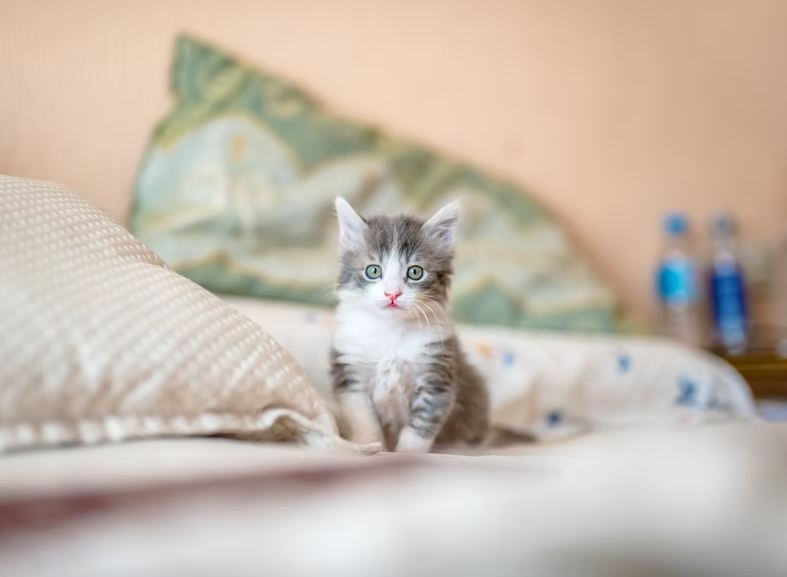If you’ve ever had a cat or kitten, then you know that cats are not the most graceful creatures. They tend to knock over the plants and chew on them, jump onto shelves and knock things off, scratch up furniture, and the list goes on.
With all of this in mind, it is important to remember that when your cat is roaming free around your home there are various dangers for them to get into – both indoors and outdoors.
Cat-Proofing Your Home – Imperative?
Every cat owner is familiar with this scenario: You bring home a new kitty, and suddenly you find yourself knee-deep in a sea of shredded paper, ripped upholstery and toothpaste smears on the bathroom floor. It’s a total nightmare.
But it doesn’t have to be! A little preparation can go a long way toward keeping your home from turning into a cat-o-riffic disaster zone. That’s why we’ve put together this handy guide to help you make your home cat friendly.
Cat-Proofing tip #1: Get a scratching post!
Cats are natural predators. They enjoy the hunt, but sometimes they can be a little rough with their toys.
You need to make sure that your cat is properly entertained so that they don’t start destroying your home. This means getting them a scratching post so they have an outlet for their natural scratching behaviour, among other things.
A scratching post may seem to be an unnecessary expense for a cat-owner, but it will save you from the financial and emotional costs of ruined furniture and carpeting.
There are many styles of scratching posts, such as those that are tall and narrow or short and squat. Some come with a dangling toy for added interest, while others have a carpeted base.
Cats usually prefer those with sisal rope rather than those made with carpet because it feels closer to what they would find in nature.
Moreover, the scratching post should be positioned in an area where your cat spends a lot of time: near the litter box or near the food bowl to encourage good behaviour!
Cat-Proofing tip #2: Make sure they have food and water at all times!
If you are like us, you love your cats. But why do they always seem to be sneaking into our cupboards and knocking things over? You may think that it’s just because they love giving their humans a hard time, but there’s actually a pretty simple explanation.
Cats are very territorial creatures. They mark their territory by spraying everything with pheromones via urine. When they can’t find places to spray, they look for other means to leave their scent behind.
Because of this, the simplest way to prevent your cat from knocking things over is to make sure they have food and water at all times. Cats need to eat every few hours, so make sure you have food in the house before bringing them home. When they’re hungry, they tend to do something unexpected!
Solution
- Make sure you have a freshwater supply that is not contaminated by algae or bacteria.
- Make sure they can access food at all times – make sure you are putting out dry food in the morning, moist food in the afternoon, and wet food at night.
- Put down plant-based mats to give your cat something soft to sit on while they eat their meals!
Cat-Proofing tip #3: Keep them away from plants!
We’re not saying don’t have plants in your house, just keep them away from your cat!
There are two instances:
- One is that your cat will destroy your plants
- The second is that your plants can be hazardous to your kitties!
Plants are a great addition to any home, but they are often toxic to cats. If you have indoor-outdoor cats or even just one that likes to roam outside then you should be aware of the dangers of plants. If your cat eats parts of a plant it could have some serious health effects. Most houseplants are toxic to cats, so keep them out of reach and out of the way.
On the other hand, cats like to climb and they like to scratch. Unfortunately, this often means that your carefully grown houseplants end up as kitty condos, and your green thumb becomes a green claw. Here are some ways you can keep your cat away from your plants:
- Make sure your plants are not near where your cat likes to sleep or play.
- If the plant is large enough, put it on a high shelf or make sure it’s in a room with a door you can close.
- Cover the soil with mulch or pebbles so cats can’t dig around.
Cat-Proofing tip #4: Secure all Electrical Cords
Cats love to chew on electrical cords. If you own a cat, you have probably found this out the hard way. Now you have to either replace the damaged cord or hide it in a place where your cat can’t get to it.
If you have many cords in your home, hiding them all is practically impossible. The best way to keep your cat from chewing on cords is to buy cord protectors. These slip over the cord and help prevent it from being chewed through.
Make sure that the ends of the cord are still accessible to plug into outlets or computers. You can also take a piece of double-sided tape and put it over the end of the cord where it goes into the wall to discourage your cat from chewing there.
Cat-Proofing tip #5: Keep Valuables in a Display Case
While cats are known to be quite adorable and cuddly, they can also be destructive. Cats love to play with objects and furniture, especially electronics. It’s important to keep valuables out of reach from your furry friend or they will just end up destroyed.
The first step is to declutter your home and remove any sharp objects and breakable items that might tempt your cat. Then install a cat-proof display case.
Cat-Proofing tip #6: Move Candles Out of their Reach
Moving candles out of reach is not the only way to prevent cats from playing with them. You can also try these simple tricks to keep your cats away from candles.
1) Put the candles in a place where the cats cannot reach them.
2) Use electric candles instead of real ones, which make no sound and emit no heat, solving the problem on both fronts.
3) If you use real candles, be sure to put them on a sturdy stand or holder that is high enough that they can’t knock it over or climb up to reach it.
Cat-Proofing tip #7: Remove Medications
Medications are the most common cause of poisoning in pets. It is important to remember that these substances can be toxic to cats and can cause them to develop serious health issues.
Medications should never be given to pets without the supervision of a veterinarian. Even if your cat does not consume it, it can lick up medication residue from surfaces like floors, furniture, or carpets.
If you are no longer taking any prescription medications, make sure you take them back to the pharmacy for disposal or contact your pharmacist for advice on how to safely dispose of unused medication.
Cat-Proofing tip #8: Close the Toilet Lid
By closing the toilet lid, you can avoid a lot of mess. Cats will not climb into the toilet and try to flush it down.
Some cats may be able to figure out how to get past this obstacle by jumping onto the sink and climbing up onto the countertop, but this is much less likely than if there is no lid on the toilet.
The cat-in-the-toilet incident can be a heartbreaking and disgusting affair. Fortunately, there are a few things that one can do to prevent it from happening.
1) Make sure that the toilet is clean and well taken care of. Human feces have a pungent odour which attracts cats. So it is important to keep the toilet bowl free from any traces of their presence. Disinfecting the toilet bowl with bleach after every use is also recommended.
2) Keep your cat from entering the bathroom when you are not home. Cats have been known to sneak into bathrooms and eat cat feces, which could lead them to get sick or even die if they ingest too much of it.
Cat-Proofing tip #9: Close the Washer and Dryer
Have you ever had a cat jump in the washer or dryer when they are in the middle of a cycle? As you all know, cats are very curious animals. However, they also can be very naughty.
So, it is important to keep your cats out of harm. One way to do this is to close the washer and dryer when not in use. This is especially true if you have young children in your home, as they will most likely leave them open while playing with their toys or doing laundry. You never know when your kitty might get curious enough to check out.
Final Words
Cat-proofing your home is not as hard as some people think. You can start by keeping all toxic substances and harmful chemicals out of reach and make sure that any cords or wires are placed in a way that they cannot be chewed on. If you want to keep your cat safe and sound, we recommend providing plenty of toys for them to play with. We hope this has been helpful!

